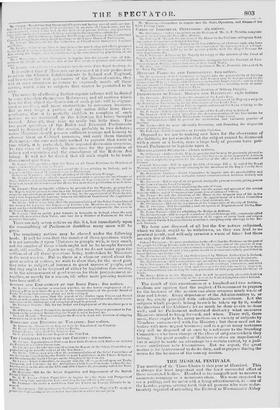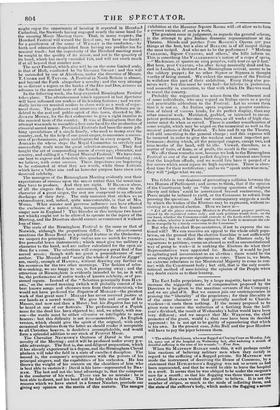THE MUSICAL FESTIVALS.
THE meet Mg of th Three Choirs is this year at Hereford. This is always the least important and the least successful effort of these associated bodies. Heteford is too iosignifleant to muster a umnerous company or a numerous choir. We were surprised to ree a pulling-, and we most add, a lying advertisement, in some of the Linden papers, setting forth that all persons who were unfor- tunately deprived of attending the Festival in Westminster Abbey
might enjoy the opportunity of hearing it repeated in Hereforel Cathedral, the Stewards having engaged nearly the same band for the ensuing Music Meeting there. That in many respects, the Hereford Festival will exceed the Royal one, we have no doubt : for a gentleman of the name of WEiLEY is the conductor,—by birth and education disqualified from having any predilecion for musical trash : but the Superiority of the Hereford meeting must be sought in the quality of its music, and not in the quantity of its band, which has rarely exceeded 150, and will not reach much if at all beyolid that number now.
The next Festival, which also will be on the same limited scale, is that of Hull, conducted by Sir GEORGE SMART: and this will be succeeded by one at Aberdeen, under the direction of Messrs. T. Cooxs and E.TAYLOR. A Festival in North Britain is almost, and beyond the Forth altogether a novelty; and the very attempt in so distant a region as the banks of the Dee and Don, evinces an advance in the musical taste of the Scotch.
In the following week, the long-expected Birmingham Festival takes place. The advertisement which appeared in last Spectator will have informed our readers of its leading features ; and we cor- dially invite our musical readers to share with us a week of enjoy- ment there. The professors and amateurs of Great Britain are in- debted to the zeal and public-spirit of ibis town, directed by Mr. JOSEPH MOORE, for the first endeavour to give a right impulse to the musical taste of the country. It was at Birmingham that the attempt was made to assemble a first-rate band for the production of classical sacred music. Provincial Festivals had been the mere job- bing speculations of a single family, who used to tramp over the country, awl, by the help of one great singer, to announce a succes- sion of performances, paltry anddisgraceful in every respect. The ASH LEYS (in whose steps the Royal Committee so servilely and successfully trod) were the great selection-mongers. They first taught the art of compounding music of every age, character, and country, and calling it a "Grand Musical Festival.- We have done our best to expose and demolish this quackery and humbug ; and, we believe, with some success. These impostures are beginning to be estimated at what they are worth, while those festivals which have a loftier aim and an honester purpose have risen into deserved celebrity. The managers of the Birmingham Meeting evidently rest their expectations of success upon the music rather than the musicians they have to produce. And they are right. If BRAHMA alone, .of all the singers they have announced, has any claim to the character of a great sieger, the rest are competent. to an efficient discharge of their duty. The only omission that strikes us as extraordinary, and, indeed, quite unaccountable, is that of Mrs. W-oon. What sinister and perverse influence can have effected the exclusion of a native artist, incomparably the best female singer now in England ? This blunder or this intrigue (we know not which) ought not to be allowed to operate to the injury of the Meeting, and the Directors should correct or counteract it without loss of time.
The scale of the Birmingham Festival is the same as that of' Norwich, although the proportions differ. The advertisement mentions the Brass Band as a principal feature in the Orchestra : we suspect too principal. Fifty violins are he match for twenty- five .powerful brass instruments ; which must give too military a character to the band, and are rather calculated for the open air than for a room. The selections will comprise a great deal of fine sacred music; though with too great a preponderance of one author. The Messiah and "nearly the whole of Israel in Egypt" are, surely, enough of HANDEL, without drawing any further on his resources for the two other mornings. The fashion of selec- tion-making, we are happy to see, is fast passing away ; and the attraction at Birmingham is evidently intended to be, as it will be, the performance of entire works of known celebrity, or of pre- sumed repute. Instead of the " Selection principally from HAN- DEL," on the second morning (which will probably consist of his best known songs and choruses torn from their connexion), who -would not have preferred the Requiem of MOZART—the greatest work of that great man ? MOZART has never received justice at our hands as a sacred writer. We give bits and scraps of his Masses, and now and then a Motet; but his Requiem has yet to be heard at one of our festivals. The performance of a Popish mass for the dead has been objected to; and, we admit, with rea- son—the words must be either effensive or intelligible to most hearers: but this difficulty is not insurmountable. An English version, which should give the spirit of the original, with such occasional deviations from the letter as should render it acceptable 4o all Christian hearers, is doubtless accomplishable, and would form a splendid addition to our stock of Festival Music. The Chevalier NEVROMM'S Oratorio of David is the great novelty of the Meeting ; and it will be produced under every pos- sible advantage. The first is, due and diligent preparation, which it has already experienced in a degree, and the Birmingham Choral phalanx will take the field in a state of excelleet discipline. The second is, the composer's acquaintance with the powers of his principal singers, and the capabilities of his orchestra. He has thrown the weight of his oratorio on the shoulders of him who is best able to sustain it : David is Isis hero—represented by BRA- HMA. The last and not the least advantage is, that the composer is the conductor of his work. There can be no mistake : he is best able to direct, and his band will be fully able to follow. The reasons which we have stated in a former Number, preclude our giving any opinion on the merits of this oratorio. The meagre
exhibition at the Hanover Square Rooms will eot allow us to form ( a correct estimate of such a work.
The greatest error in judgment, as regards the general scheme, is the attempt to give Italian dramatic representations at the Theatre. Shreds and patches front ROSSINI'S Operas are poor things at the best, but a slice of BELLINI is of all insipid thlogs the most insipid. And who arc to be the performers? "Madame CARADORI, Signor Cuiriorri, and others," the bills inform us. This is something like VALLEHREGUE'S notion of a corps d' opera, —"Ma femme, et quatre ou cinq poupe•es, voila tout ce quit faut." But here, poor CURIONI, eho after being musically dead and bu- ried in London, is destined to a Birmingham revival, seems to be the solitary puppet ; for no other Signor or Signora is thought worthy of being named. We exhort the managers of the Festival to withdraw this part of their exhibition. Every thing else pro- mises well : but this must be very bad—far inferior in pretension, and assuredly in execution, to that with which De BEGNIS used to travel the country.
Probably the suggestion has arisen from the wellmeant zeal of some individuals, who may regard an Italian opera as a pretty and practicable addendum to the Festival. Let us assure them that it is not so. An Italian opera requires a greater combina- tion of talent of various kinds, for its perfect display, than any other musical work. Mutilated, garbled, or intrusted to incom- petent performers, it becomes ludicrous, as all works of high ch. racter must do when so served. There is another consideration of some weight, which may be urged on the unmusical as well as the musical patrons of this Festival. To hire and fit up the Theatre, will add something to the general charge ; and this expense will be incurred in order to give the weakest and most imperfect per- formance; during which, all the principal singers, except two, and nine-tenths of the band, will be idle. Viewed, therefore, as a matter of taste, of fame, or of profit, the result is the same. We offer these remarks now, because we look to the Birmingham Festival as one of the most perfect displays of musical excellence that the kingdom affords, and we would fain have it purged of a few errors which must injure its high reputation. There is abun- dant time for their rectification ; and as we "speak unto wise men," they will "judge what we say."





















 Previous page
Previous page